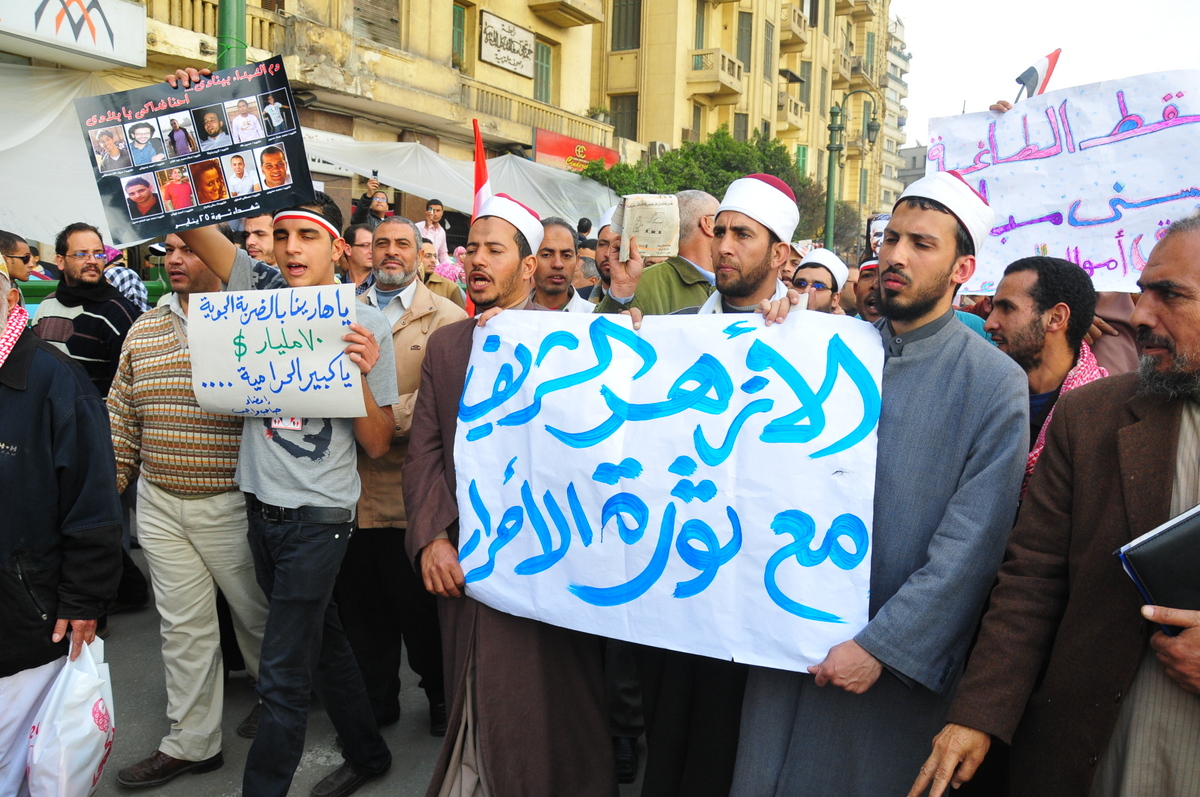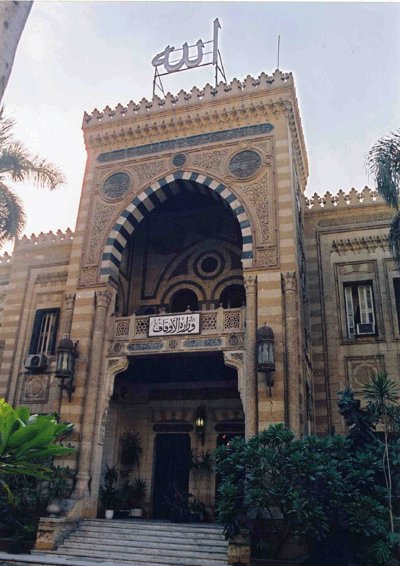
(Photo from facebook)
- “Hello Sir. You’ve reached the Ministry of Interior. You behave, we don’t shoot. How may I help you?”
- “Hi. Can you transfer me to the department for protests please?”
[On hold music plays: Teslam El-Ayadi, a song that praises the army]
- “Yes Sir. This is the protests’ department. Is your protest supporting the government or against it?”
- “It is not pro-government. We would like to hold the protest in Tahrir Square from 4 to 8 pm this Friday.”
- “I am sorry Sir but the square is fully booked for pro-government protests until 2016. We can give you the nearby Mohamed Farid Square from 4 to 6 pm. Then you can go to Talaat Harb Square from 6 to 8 pm.”
- “I am sorry I don’t understand, how would I be in both squares at 6?”
- “Do not worry Sir, the police will start attacking you and the other protesters shortly before 6, so you will all have time to run towards Talaat Harb…”
- “…”
- “Sir, how would you prefer to have your protest dispersed? We have water and tear gas.”
- “Well, it is a bit cold, so can we avoid water?”
- “If this is your only concern about water, please be informed that we have introduced a new option for your convenience: burning hot water.”
- “Ummm… okay… are we done?”
- “Yes sir, do not worry, the police will be knocking on your doors in 10 minutes…Goodbye!”

(Photo from facebook)
This telephone conversation between an Egyptian citizen and a police officer at the Ministry of Interior could have almost been real under Egypt’s controversial Protest Law, only it was a sarcastic scene from the socio-political comedy play, entitled “1980 and Upwards”.
Written by Mahmoud Galal and directed by Mohamed Gabr, the play has received the National Festival for Theatre award. The theme revolves around the generation that was born in the 1980s and upwards, providing a picture of post-revolution Egypt from the perspective of the young.
Fourteen young men and women have carried their hopes and dreams through the revolution, yet could not reap the results they desired. Young people in their 20s and 30s feel burdened by the hardship of obtaining a decent life in the society.
Their performance shed light on some of the socio-economic and political issues that this generation has undergone since the revolution, through an hour of short sketches, in a show mixing feelings of happiness and agony, mockery and drama, hope and disappointment.
The cast, all Ain Shams University graduates, prefers to see it as more socially oriented, as this was their primary focus. Yet, political content could not be avoided when speaking of the revolution. Cleverly and daringly presented, the play denounces dictatorships. Presidents Hosni Mubarak, Mohamed Morsi and Abdel Fattah Al-Sisi all got their shares.
Political jokes were loudly applauded. The audience heavily cheered when one actor asked: “Do I absolutely need to attend military school to become president?”

(Photo from facebook)
Nonetheless, scenes on social and economic problems faced by the youth were as effective. They discussed the difficulties in pre-marital preparations, unemployment, price hikes, the social side-effects of technology, and sexism against women.
In a scene about ‘spinsterhood’ where the actress stated she was “29 and still single”, a woman in the audience was heard saying: “I feel like I should be crying about my case”, as the rest of the crowd laughed.
Two types of scenes besides the sketches were also remarkable in the play. On the one hand, there were two songs to which the audience reacted extraordinarily by singing and cheering. The first one was by the Ultras football fans, entitled ‘Freedom’.
The second song was their own lyrics, brilliantly mixing between several classical Egyptian operettas such as “The Sanes”, which is a song from an old movie called “The Millionaire” depicting a group of “insane patients”. There were also parts from the well-known traditional puppets operetta of “El-Leila El-Kebeera”, and a song by the famous trio Tholathy Adwa’a Al-Masrah, who used to perform on the very same stage.
On another note, the opening and ending scenes were a motif, repeated throughout the play. It represented friends gathered for a group picture. Each actor stated his age and a comment about how they felt towards the country and the society. One could see the dramatic transition between each of those scenes, which started very joyfully, then gradually became sadder.
As for the story behind the play, it all began on the night of 30 December, 2011, says Mohamed El-Attaby, a 28-year-old actor and one of the first in the group. “A group of graduate students gathered and decided to come up with something,” El-Attaby told Daily News Egypt.
“Somebody said 1980, somebody else added ‘upwards’, and it was done. We forced ourselves to do it by booking a show at the National Theatre Festival due to take place ten days later,” he continued.
“1980 and Upwards” is neither a large nor commercial production. “Independent and self-funded”, as director Mahmoud Gabr put it, it does not belong to the National Theatre although it was awarded the prize. He admitted that it was hard for the show to be supported by state institutions due to its “rebelling theme”, recalling two incidents.

(Photo handout from Gamal)
Gabr told Daily News Egypt that the play was once allowed to perform at the Child Culture Palace affiliated with the state Ministry of Culture, but was cancelled 15 days later. He believes it was “intentional”. Moreover, the award-winning cast was set to perform at the National Theatre, but was told there was “no availability”.
Nonetheless, the team feels incredibly proud of the popular success they have made so far, especially since the beginning of this year. They remembered how they used to perform in front of five or 10 people, and compared it to the crowded audience nowadays. The play was fully broadcast by an Egyptian private satellite TV channel.
On one of the evenings the play was showing, dozens gathered at the Hossapir Theatre near Downtown, impatient for the doors to open. The show has been running there for almost a month already. The medium-sized room was full amid the presence of some Egyptian actors among the audience.
“Because we were used to university theatre, this experience is very different when it comes to the audience,” actress Omneya Hassan, 25, told Daily News Egypt. “We can feel their interaction due to the down-to-earth nature of the show,” she said.
Likewise, El-Attaby stated that what was great about it is that the play reached a wide range of people, not just the youth and theatre lovers. “The issues we discuss are realistic. Fathers see their sons in them. We’re like a mirror for our and previous generations,” El-Attaby added.
In fact, the audience varied between different age groups. Families attended. Many people attended the play more than once. During the act, whispers could be heard in the theatre room repeating lines from the play before they were said on stage. “Some broke records by attending 10 times,” said El-Attaby.
As previously mentioned, the play has been the talk of many Egyptians in the past two months, but as a matter of fact, it has been running since 2012. “The best part is that we constantly get to update our story according to events,” Gabr said.
The play was born with the purpose of continuation, Gabr explained. “Changing scenes in it according to ongoing events is not a coincidence, we aimed for that. Maybe after 10 or 20 years we would still be performing it. We will not be as young and our perspective could change.”
“For me, one of the most interesting practices is that we interchange roles in every new show,” Hassan said. “We all know it by heart and sometimes people have to step in to cover others,” El-Attaby said.
The creators of “1980 and Upwards” really wish to stand out and break taboos, even when it comes to rules of theatre and acting. “We did not follow the traditional system of having a script looked into by a director, then drawing a frame for the actors and so on,” said El-Attaby. “We chose not to be categorised in one school of theatre or another. We’re being natural and we like the way we reach people,” he added.

(Photo handout from Gamal)
This is also why Gabr said they refuse to belong to any funding organisation. “We don’t want to be told what to say or act,” he said.
On the other hand, the group has little promotional means, but rather mainly counts on the public itself. “If you liked the show, tell a friend to come,” they would say. Each performance is unique, as lines are added and faces alternate for every performance.
And the writer, director and actors all agree that besides the award, which is the highest prize in the field they can get, their best achievement is that their audience widened. “Our big dream is just beginning to come true,” said Gabr.



